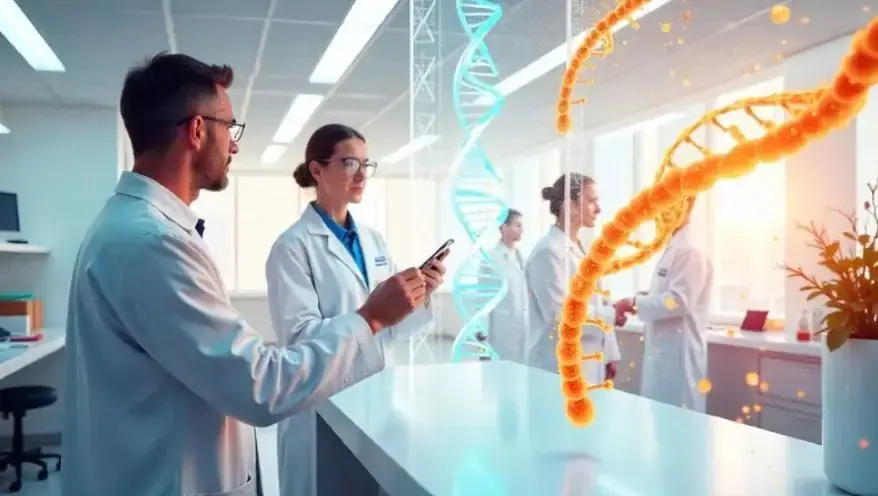Genomics, Proteomics, Bioinformatics: Pioneering Biomedical Research for Future Scientists
As a Young Scientist awardee from DST-SERB, I am deeply passionate about guiding the next generation of enthusiasts in biomedical research. Especially in Genomics, Proteomics, and Bioinformatics. Thus, I aim to inspire and educate students in grades 8-12 by exploring these exciting fields. Eventually, showcasing their relevance and outlining opportunities for aspiring scientists to make a real-world impact.
The Interconnected Worlds of Genomics, Proteomics, and Bioinformatics

Genomics, proteomics, and bioinformatics are interconnected fields driving advancements in biomedical research.
- Genomics: The study of an organism’s entire genetic makeup, or genome, is a key component of biomedical research. It involves sequencing, mapping, and analyzing genes to understand their structure, function, and role in disease. Moreover, understanding genomics has transformed medicine by allowing us to identify genetic predispositions to diseases. Such as cancer, diabetes, and heart disease.
- Proteomics: This focuses on studying the complete set of proteins, or proteome, produced by an organism. Proteins are the workhorses of cells, and proteomics helps us understand their functions, interactions, and modifications. Furthermore, proteomics plays a crucial role in discovering biomarkers for early disease detection and in developing targeted therapies. Thereby contributing significantly to advancements in biomedical research.
- Bioinformatics: This is the application of computational tools and techniques to analyze large biological datasets. Furthermore, it integrates genomics, proteomics, and other “omics” data to extract meaningful insights. Consequently, bioinformatics enables us to model complex biological systems, predict drug targets, and personalize medical treatments.
Real-World Applications:
- Personalized Medicine: Tailoring treatments based on an individual’s genetic makeup.
- Drug Discovery: Identifying new drug targets and designing more effective therapies.
- Disease Diagnostics: Developing faster and more accurate diagnostic tests.
Educational Opportunities in Biomedical Research
To embark on a journey in these fields, students can pursue:
- Undergraduate Degrees: Biotechnology, Bioinformatics, Biomedical Engineering, Genetics, or related sciences.
- Course Content: Genetics, molecular biology, biochemistry, data analysis, programming (Python, R), and statistics.
- Software/Tools: R, Python, Bioconductor, bioinformatics databases (NCBI, Ensembl).
- Sponsored Projects/Research Opportunities: Participate in summer research programs, seek out mentors, and work on bioinformatics projects.
Skills to Acquire
1. Lab techniques (PCR, DNA sequencing):
These abilities are essential for producing the biological data that is then subjected to computational analysis. A crucial stage in genetic study and diagnostics, PCR (Polymerase Chain Reaction) is a potent method for amplifying particular DNA segments. This method is especially significant because it enables researchers to produce many copies of a particular DNA sequence. Furthermore, this facilitates analysis and investigation.
Conversely, DNA sequencing establishes the exact arrangement of nucleotides within a DNA molecule. This procedure yields the raw data needed to examine the genome, or complete genetic composition, of an organism. Moreover, it is a crucial step in creating tailored treatments and comprehending the genetic causes of illnesses. Consequently, such analysis plays a vital role in advancing biomedical research and improving patient care.

2. Analyzing Data:
This ability is not only essential but also the key to solving the mysteries of intricate biological systems. Also, it entails using computational methods and tools to analyze the enormous volumes of biological data produced by proteomics and genomics studies. Techniques involve identifying patterns and trends and drawing insightful conclusions. Eventually, comprehending intricate biological systems through the use of statistical and computational techniques.
3. Modeling via Computation:
This ability is not only revolutionary but also crucial. Moreover, it goes beyond simple analysis to biological system simulation. It models the functioning of intricate biological systems using computer techniques, thereby opening new possibilities for innovation in biomedical research. This is especially crucial for tasks like identifying novel drug targets. Also, creating more potent treatments by analyzing the interactions between various biological system components.
4. Database Management:
Skills in integrating datasets from diverse biological sources, filtering relevant data, and reconciling different annotation formats are essential in biomedical research. Furthermore, the ability to organize, curate, and document biological data ensures consistency and reliability for computational workflows. Consequently, these competencies form a strong foundation for effective data-driven discoveries in modern science.

Career Path
A career in Genomics, Proteomics, and Bioinformatics offers numerous possibilities:
- Entry-Level: Research Assistant, Bioinformatics Analyst, Lab Technician.
- Mid-Level: Research Scientist, Data Scientist, Bioinformatics Specialist, Scientific Writer.
- Advanced Level: Principal Investigator, Research Director, Professor, Consultant.
- Job Roles: Analyzing genomic data, identifying drug targets, developing diagnostic tools, and publishing research articles.
- Major Employers: Pharmaceutical companies, biotechnology firms, research institutions, hospitals, and government agencies.
Conclusion
Genomics, proteomics, and bioinformatics are revolutionizing healthcare. Moreover, it offers unprecedented opportunities for scientific innovation. By and large, acquiring the right education, skills, and experiences allows students to play a significant role in shaping the future of biomedical research. In particular, the insights gained from these fields are reducing inequalities in healthcare by enabling personalized treatments and early detection of diseases. Consequently, these advancements are ultimately improving health outcomes for all.
How to Convert Your Passion into a Futuristic Profession:
- Engage in DIY Projects: Analyze publicly available datasets (e.g., from NCBI) using Python or R.
- Attend Workshops and Webinars: Participate in events focused on bioinformatics and genomics.
- Seek Mentorship: Connect with researchers in the field for guidance.
References
- Jain, A. S., Prasad, A., Pradeep, S., Dharmashekar, C., Achar, R. R., Silina, E., Stupin, V., Amachawadi, R. G., Prasad, S. K., Pruthvish, R., Syed, A., Shivamallu, C., & Kollur, S. P. (2021). Everything old is new again: Drug Repurposing Approach for Non-Small Cell Lung Cancer Targeting MAPK Signaling Pathway. Frontiers in Oncology, 11. https://doi.org/10.3389/fonc.2021.741326
- Shreevatsa, B., Hegde, S., Narayan, P., Dharmashekar, C., Jain, A., Wani, T. A., Prabhuswamimath, S. C., Kollur, S. P., & Shivamallu, C. (2024). Targeting FAK, VEGF, and MTA1 proteins with Terminalia elliptica: a computational approach for anticancer activity. Frontiers in Oncology, 14. https://doi.org/10.3389/fonc.2024.1427632
- Murali, M., Gowtham, H. G., Shilpa, N., Krishnappa, H. K. N., Ledesma, A. E., Jain, A. S., Shati, A. A., Alfaifi, M. Y., Elbehairi, S. E. I., Achar, R. R., Silina, E., Stupin, V., Ortega-Castro, J., Frau, J., Flores-Holguín, N., Amruthesh, K. N., Shivamallu, C., Kollur, S. P., & Glossman-Mitnik, D. (2022). Exploration of Anti-HIV Phytocompounds against SARS-CoV-2 Main Protease: Structure-Based Screening, Molecular Simulation, ADME Analysis and Conceptual DFT Studies. Molecules, 27(23), 8288. https://doi.org/10.3390/molecules27238288
- Shivamallu, C., Gopal, S. M., Vaidya, G., Shreevatsa, B., Bhavana, H. H., Srinivasa, C., Gopinath, S. M., Kollur, S. P., Patil, S. S., Suresh, K. P., Achar, R. R., Prasad, A., & Dharmashekara, C. (2021). Comprehensive Analysis and Assessment on Codon Usage Pattern of Hemolytic Genes from Different Strains of Leptospira interrogans. Journal of Pharmaceutical Research International, 400–410. https://doi.org/10.9734/jpri/2021/v33i60b34635
Additionally, to stay updated with the latest developments in STEM research, visit ENTECH Online. Basically, this is our digital magazine for science, technology, engineering, and mathematics. Furthermore, at ENTECH Online, you’ll find a wealth of information.






